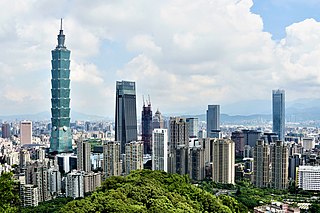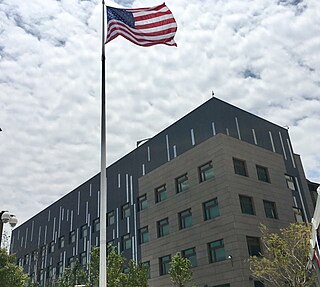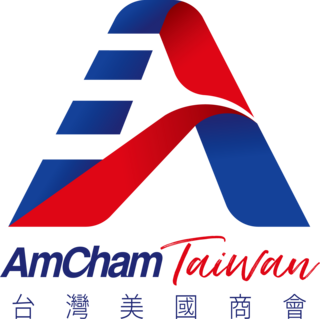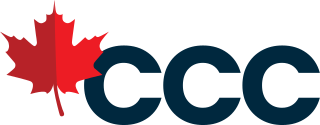
The economy of Taiwan is a highly developed free-market economy. It is the 8th largest in Asia and 20th-largest in the world by purchasing power parity, allowing Taiwan to be included in the advanced economies group by the International Monetary Fund. Taiwan is notable for its rapid economic development from an agriculture-based society to an industrialised, high-income country. This economic growth has been described as the Taiwan Miracle. It is gauged in the high-income economies group by the World Bank. Taiwan is one of the most technologically advanced computer microchip and high-tech electronics industries makers in the world.

The International Trade Administration (ITA) is an agency in the United States Department of Commerce that promotes United States exports of nonagricultural U.S. goods and services.

The American Institute in Taiwan is the de facto embassy of the United States of America in Taiwan. AIT is a wholly owned subsidiary of the federal government of the United States in Taiwan with Congressional oversight. The AIT was officially created as a U.S. government-sponsored nonprofit, private corporation established under the auspices of the U.S. government to serve its interests in Taiwan.
An export in international trade is a good produced in one country that is sold into another country or a service provided in one country for a national or resident of another country. The seller of such goods or the service provider is an exporter; the foreign buyers is an importer. Services that figure in international trade include financial, accounting and other professional services, tourism, education as well as intellectual property rights.

The Taipei Economic and Cultural Representative Office (TECRO), also known as Taipei Economic and Cultural Office (TECO), Taipei Representative Office (TRO) or Taipei Mission, is an alternative diplomatic institution serving as a de facto embassy or a consulate of the Republic of China to exercise the foreign affairs and consular services in specific countries which have established formal diplomatic relations with the People's Republic of China. The PRC denies the legitimacy of the ROC as a sovereign state and claims the ROC-controlled territories as an integral part of its territory. An exclusive mandate, namely One-China policy, requires that any country wishing to establish a diplomatic relationship with the PRC must first sever any formal relationship with the ROC. According to The Fletcher Forum of World Affairs, "non-recognition of the Taiwanese government is a prerequisite for conducting formal diplomatic relations with the PRC—in effect forcing other governments to choose between Beijing and Taipei." As a result, these countries only allow the ROC to establish representative offices instead of a fully-fledged embassy or consulate for the purpose of conducting practical bilateral relations without granting full diplomatic recognition.
Japan External Trade Organization is an Independent Administrative Institution established by Japan Export Trade Research Organization as a nonprofit corporation in Osaka in February 1952, reorganized under the Ministry of International Trade and Industry (MITI) in 1958, and became an Independent Administrative Institution in 2003 to consolidate Japan's efforts in export promotion. The government has provided more than half of JETRO's annual operating budget. As of January 2020, JETRO maintained seventy-four offices in fifty-four countries, as well as forty-eight regional offices in Japan, with a total staff of 1,730. Its main office is located in the Ark Mori Building in Akasaka, Tokyo. Initially, JETRO's activities focused mainly on promoting exports to other countries. As exporters established themselves in world markets and the balance of trade turned from deficit to surplus, however, JETRO's role shifted to encompass more varied activities. These have included the furtherance of mutual understanding with trading partners, strategic investment attraction, import promotion, liaison between small businesses in Japan and their overseas counterparts, and data dissemination. Import promotion services have included publications, promotion of trade fairs, seminars, and trade missions.
The Foreign Agricultural Service (FAS) is the foreign affairs agency with primary responsibility for the United States Department of Agriculture's (USDA) overseas programs – market development, international trade agreements and negotiations, and the collection of statistics and market information. It also administers the USDA's export credit guarantee and food aid programs and helps increase income and food availability in developing nations by mobilizing expertise for agriculturally led economic growth. The FAS mission statement reads, "Linking U.S. agriculture to the world to enhance export opportunities and global food security," and its motto is "Linking U.S. Agriculture to the World."

The American Chamber of Commerce in Taiwan is an international business association based in Taipei City, Taiwan, with about 1,100 members representing over 580 companies across various sectors.

A Trade and Investment Framework Agreement (TIFA) is a trade pact that establishes a framework for expanding trade and resolving outstanding disputes between countries.
The Customs-Trade Partnership Against Terrorism (C-TPAT) is a voluntary supply-chain security program led by U.S. Customs and Border Protection (CBP) focused on improving the security of private companies' supply chains with respect to terrorism. The program was launched in November 2001 with seven initial participants, all large U.S. companies. As of December 1, 2014, the program had 10,854 members. The 4,315 importers in the program account for approximately 54% of the value of all merchandise imported into the U.S.

The U.S. Trade and Development Agency (USTDA) is an independent agency of the United States government, formed in 1992 to advance economic development and U.S. commercial interests in developing and middle income countries.
The Export Yellow Pages (EYP) was a multi-media trade and promotion resource for exporters that provides U.S. companies, exporters and export related service providers across all industries a convenient way to engage in export promotion and establish contacts and conduct business and trade around the globe with international buyers. Through the EYP, the Department of Commerce offers all U.S. companies and service providers a free online and print business directory listing and access to the directory and multi-media export.

Agriculture is one of the main industries in Taiwan. It contributes to the food security, rural development and conservation of Taiwan. Around 24% of Taiwan's land is used for farming.

Diplomatic relations between the United States and Suriname were established on 23 January 1976. Suriname has an embassy in Washington, D.C. since 1976, and a consulate in Miami. The United States had a consulate in Paramaribo since 25 November 1975, the date of independence which was upgraded to an embassy on 18 February 1976.

After the United States established diplomatic relations with the People's Republic of China (PRC) in 1979 and recognized Beijing as the only legal government of China, Taiwan–United States relations became unofficial and informal following terms of the Taiwan Relations Act (TRA), which allows the United States to have relations with the Taiwanese people and their government, whose name is not specified. U.S.–Taiwan relations were further informally grounded in the Six Assurances in response to the third communiqué on the establishment of US–PRC relations. The Taiwan Travel Act, passed by the U.S. Congress on March 16, 2018, allows high-level U.S. officials to visit Taiwan and vice versa. Both sides have since signed a consular agreement formalizing their existent consular relations on September 13, 2019. The US government removed self-imposed restrictions on executive branch contacts with Taiwan on January 9, 2021.

The Canadian Commercial Corporation is a Canadian federal Crown corporation mandated to support the growth of international trade by helping Canadian exporters gain access to foreign government procurement markets and by helping government buyers abroad to obtain goods from Canada. The ability to enter into commercial contracts as a Government of Canada entity through CCC is designed to give Canadian exporters the opportunity to mitigate risks associated with foreign procurement and international contracting. Canadian businesses exported $2.92 billion in products and services through CCC contracts during the CCC’s 2020-2021 fiscal year.

New Zealand Trade and Enterprise (NZTE) is New Zealand's economic development and trade promotion agency. It offers strategic advice, access to networks and influencers, research and market intelligence, and targeted financial support to help businesses on their international journey, and works to promote and support the growth of New Zealand business overseas.
Taiwan International Fastener Show is one of the world's largest professional trade fairs focused on the fastener industry. It takes place biennially in the Kaohsiung Arena in Kaohsiung, Taiwan. The show is organized jointly by TAITRA, Taiwan External Trade Development Council, and TIFI, Taiwan Industrial Fastener Institute.

The Republic of China (Taiwan) and the Federative Republic of Brazil do not have official diplomatic relations, as Brazil acknowledges the One-China policy. However, the two nations maintain unofficial diplomatic relations via economic and cultural offices.












